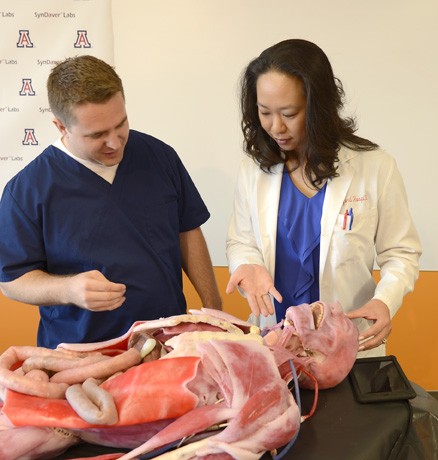UA medical students will be the first in the country to have a synthetic cadaver lab where they can practice medical procedures on life-like patients.
The UA College of Medicine — Phoenix and SynDaver Labs recently announced a partnership to create a new synthetic cadaver lab. Medical students will be able to use the synthetic cadavers in clinical training and surgical simulation in place of live animals and human patients, according to Al Bravo, associate director of Public Affairs at the College of Medicine — Phoenix.
The cadavers have bones, muscles, arteries, organs and can breathe said Christopher Sakezles, president of SynDaver Labs.
Sakezles, who has been president for nine years, got into the business of synthetic cadavers because of an experience he had working on a medical project developing a device related to the trachea in grad school. He said the group he was working with didn’t have the money to pay for an animal study, so they got a small trachea model to test their device.
The model, however, was “a complete piece of crap” and was unusable, he added.
“Because of that [experience], I set about doing something better and used my knowledge to accomplish that,” Sakezles said.
Medical students face challenges similar to what Sakezles had to contend with when trying to get experience with medical procedures on the human body, said Dr. Teresa Wu, the simulation curriculum director and a UA associate professor in emergency medicine.
“Prior to this, medical students across the country typically had to learn to do procedures for the first time either on animal parts or trainers that were unrealistic,” Wu said, “and in some instances, the first time you did [these procedures] was on a live patient.”
The synthetic cadavers should take away much of the fear and anxiety that many medical students face when they have the opportunity to train before performing a procedure on a live patient, Wu added. The synthetic tissues in the cadaver feel like real skin, muscle, fascia and vessels, which gives students a more realistic feeling, according to Wu.
The synthetic cadaver lab is currently in production, and the students at the College of Medicine — Phoenix will be the first in the country to have this kind of lab available, according to Wu. This lab is the product of the collaboration between the college and SynDaver, a partnership which began in 2010.
“We’re going to Phoenix so we can collaborate with our colleagues there in the College of Medicine to validate these models, improve them and develop the next generation beyond what we’re currently building,” Sakezles said.
In addition to providing new technology to the medical students, the partnership with SynDaver will provide an economic boost to the Phoenix economy, Bravo said, as it could create up to 1,000 new jobs in the area. Wu agreed and said preparing students for the professional field is one of the goals of the college’s partnership with SynDaver.
“Our goal with this partnership is to train the best physicians in the country,” Wu said. “We want our medical students to have the opportunity to practice and hone their skills and improve patient safety in advanced medical education.”
– Follow Ethan McSweeney @ethanmcsweeney









